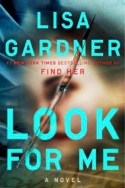 Synopsis:
Synopsis:
Three women. So many lies.
Boston Police Sergeant D. D. Warren and her confidential informant, Flora Dane, are back and working together to solve a case that begins with a pregnant wife, Evie, allegedly murdering her husband, Conrad. He was shot three times while sitting at his desk in his home office, but his laptop computer was also murdered — shot twelve times. When the police respond to a report of shots fired, they find Evie holding the gun.
D. D. immediately recognizes Evie because sixteen years ago, when Evie was sixteen years old, she shot and killed her father, a brilliant theoretical mathematician and professor. Both Evie and her mother claimed that Evie accidentally shot her father while handling his new shotgun, so his death was ruled accidental.
But for D.D., two gunshot deaths is two too many. Evie is immediately charged with Conrad’s murder.
Flora, who survived unspeakable crimes committed by her kidnapper and captor, immediately recognizes Conrad when she sees a tv news report about his death. She recalls a meeting in a bar between Conrad and her captor. Flora lives with survivor’s guilt and realizes that after her release she never sought Conrad out. She is determined to learn the connection between Conrad and her captor, and, hopefully, discover information about her captor’s other victims.
D.D. and Flora quickly discover that the truth is elusive as, layer by layer, they peel away half-truths, omissions, and outright lies.
How many secrets can one family have?
Review:

Lisa Gardner has been lauded “the master of the psychological thriller.” And with Never Tell, the tenth installment in the D. D. Warren series, she lives up to that title.
Gardner has constructed another mystery that keeps readers guessing until the very end. It is a multi-layered, elusive exploration of the underside of society — the dark web and the types of transactions entered into there; the twisted obsessions that can be indulged and the sordid appetites that can be fulfilled there.
It is also a family drama. Evie discovers truths about her parents’ marriage and her father’s relationships with his fellow faculty members, and gains a new appreciation of the extent of her mother’s capacity for melodramatic machinations in the name of family and love. Through Evie’s experience of being pregnant for the first time and her wildly dysfunctional relationship with her mother, Gardner explores the complicated emotions of motherhood and a mother’s instinct to protect her child. Evie gradually realizes that her whole life has been founded on lies and deceit, stories that she has been told by her parents, as well as her husband, with which she went along. But as the story progresses, Evie realizes that she was right to be suspicious, but too weak, timid, and fearful to act on them. Of course, Evie has told her own share of lies since that day sixteen years ago when she and her mother returned home and discovered her father’s lifeless body.
Gardner has brought back the fascinating character of Flora Dane, who first appeared in Find Her, due to reader response. As established in that installment, Flora was kidnapped as a teenager and held captive for more than three years, during which time she was subjected to unspeakable horrors. Since her release, she has been a vigilante and advocate, working when she can, unable to settle back into her former life. She describes herself now as a woman who looks at a handsome man and “instantly thinks of Ted Bundy.” In the seven years since her release, she has not enjoyed a single good night’s sleep. “I don’t have romantic dreams or aspirations anymore. Some survivors do. They figure out how to compartmentalize, that was then, this is now. I can’t. I live in a state of lockdown. I spent so long separating my mind from my body in order to survive another day, I can’t get it back. My body is merely a tool. Jacob used it for sec I sue it for revenge.” Gardner notes that Flora has no happily ever after. She survived. “So why can’t she feel happy? Why does she still feel so isolated, so dead inside?” Flora is haunted by survivor’s guilt. Jacob, her captor, said, “No one wants to be a monster.” But he was her monster. And she is haunted by speculation about whether he was other girls’ monster, as well. “Did my monster leave behind other living victims besides me?” And that motivates her to work with D.D. Gardner explains that Flora “is finding a sense of purpose in working with other victims and it’s interesting to give her and D.D. something of a shared goal.”
“Too much of my life has been lies. I get to own that. Too much of my life has been isolating. I get to own that, too. And too much of my life has been spent running away instead of running toward. I want something to run toward. My child. A community. Friends.” ~~ Evie in Never Tell
As they search for two killers, as well as an arsonist, D.D., federal agent Kimberly Quincy, Flora, and Keith, an amateur true crime sleuth Flora enlists to assist, peel away decades of lies and omissions among Evie’s family, and discover more and more secrets. The book’s pace quickens and the tension heightens as D.D., et al. get closer to unraveling the truth. Gardner convincingly enhances the danger her characters face. Can they solve the mystery in time to save Evie and her unborn child? And if they succeed, will the truth finally empower Evie to live life on her own terms when she realizes that “I thought I was the one carrying around secrets. Instead, it’s the people I love who’ve never trusted me with the truth. Who’ve manipulated me, over and over again.”
With Never Tell, Gardner proves again that she is a master at creating tightly constructed, driving mysteries that are also viscerally raw and chilling, yet deeply touching and emotionally satisfying.
Excerpt from Never Tell
Chapter 1
Evie
By the time I pull my car into the garage, my hands are shaking on the wheel. I tell myself I have no reason to feel so nervous. I tell myself I’ve done nothing wrong. I still sit there an extra beat, staring straight ahead, as if some magic answer to the mess that is my life will appear in the windshield.
It doesn’t.
With a bit of care, I can still slide out of the driver’s seat. I’m bigger, but not that much bigger. I fight more with my bulky coat and the strap of my oversized purse, as I ease out from behind the steering wheel. Conrad bought me the purse as a Christmas gift last year. From Coach. Real leather. At least a couple hundred dollars. At the time, I’d been so excited I’d thrown my arms around him and squealed. He’d laughed, told me he’d seen me eyeing the bag in the store and had just known he had to get it for me.
When I’d hugged him then, he’d hugged me back. When I’d laughed that day, and giddily opened up the huge, gray leather bag to explore all the compartments, he’d laughed with me.
Christmas morning. Nearly one year ago.
Had we hugged since? Laughed since?
The bulge in my belly would argue we’d found some way to connect, and yet, if not for the streams of bright colored lights and gaudy decorations covering my neighborhood, I’m not sure it would feel like the holidays at all. As it is, we’re one of the last undecorated houses on the block. A wreath on our door; that’s it. Each weekend, we promised to get a tree. Each weekend, we didn’t.
I take my time hefting my purse over my shoulder. Then I turn and face the door leading from the garage into the house.
Dead man walking, I think. And something crumples inside me. I don’t cry. But I’m not sure why.
The door is open. Cracked slightly. As if on the way out, I didn’t pull it hard enough shut. Letting out all the heat, my father would say, which causes me a fresh pang of pain.
I push through the interior door, close it firmly behind me. That’s it. I’m home. Standing in the mudroom. Another day done. Another night to begin.
Hang up the purse. Shrug out of the coat. Ease off the boots. Jacket on the coatrack. Shoes on the mat. I fish my cell phone out of my bag and set it up on the side table to charge. Then, I take a final moment.
Breathe in. Breathe out.
Listening for him.
The kitchen? He could be sitting at the table. Waiting in front of a cold dinner. Or pointedly taking the last bite. Or maybe he’s moved into the family room, ensconced in his recliner, feet up, beer in hand, eyes glued to ESPN. Sunday is football. Go Patriots. I’ve lived in Boston long enough to know that much. But Tuesday night? I never got into sports. He’d watch; I’d read. Back in the days when we spent so much time glued together, it seemed natural to also have some time apart.
I don’t hear the clinking of silverware from the kitchen. Nor the low rumble of TV from the family room.
Door open, I remember. And my left hand flattens on the relatively small, but noticeable, curve of my belly.
The hall leads me to the kitchen. A spindly table sits in front of the back window. No sign of dinner. But then I notice a rinsed plate lying neatly in the sink.
Breathe in. Breathe out.
I should have a story, I think. An excuse. A lie. Something. But in the growing silence, my thoughts churn more, my brain spinning wildly.
Dead man walking. Dead woman walking?
I’m going to vomit. I can blame it on the baby. You can blame anything on pregnancy. I’m sick, I’m tired, I’m stupid, I lost track of time. Baby brain, pregnancy hormones. For nine whole months, nothing has to be my fault. And yet . . .
Why did I come home tonight? Except, of course, where else do I have to go? Ever since I first met Conrad ten years ago . . . He noticed me. He saw me. He forgave me.
And I loved him.
Ten whole years, I have loved him.
I leave the kitchen. It’s small and, like the rest of the 1950s house, still in desperate need of updating. We purchased the place with hope and aspiration. Sure it sat on a postage stamp yard, and each room was tinier than the last, but it was ours. And being young and handy, we’d fix it up, open it up, then sell it for oodles of money.
Now I walk down a narrow hallway where half the wallpaper hangs down in pieces and do my best not to notice.
Family room. Den, really. With Conrad’s beloved La-Z-Boy, a modest sofa, and of course, an enormous flat-screen TV. The recliner is empty. The TV is off. The room is empty.
Door open, I remember again.
Our garage fits only a single vehicle, and even that is a perk in a Boston neighborhood. Conrad parks his Jeep on the street. Which I check now. Because I’d spotted it pulling into the driveway and, yes, there it is. Black Jeep. Situated at the curb straight outside. A prime spot I can already imagine he was thrilled to get, as even with parking permits, there’s more demand than supply. Hence his kindness in giving me the garage.
It’s okay, honey. I don’t want you walking down the street alone at night. I like knowing that you’re safe.
Dead woman walking. Dead woman walking.
Don’t vomit now.
And then . . .
Then . . .
“Door open,” I whisper. And I finally notice what I should’ve noticed from the very beginning.
Smell. I’d been listening for the sound of my husband. The clatter of silverware in the kitchen. The thump of his recliner banging back in the family room. But there aren’t any sounds. No sounds at all.
The house is hushed. Quiet. Still.
As if it were empty.
Smell.
The stairs leading to the second floor are like the rest of the house, narrow, confining, creaky. Conrad tightened the bannister three months ago. When I broke the news. When we both stood in our bedroom and stared at the little stick. My hands had been shaking so hard he’d had to take it from me.
I remember feeling ill then, too. Willing myself not to vomit, though it had been the near-constant queasiness that had led me to take the pregnancy test. A marriage is a mosaic of a thousand moments, a hundred precious memories. That day, watching his hands close around mine. Strong fingers, seamed with calluses. Steady, as they took the pregnancy stick away from me, held it closer to him.
I had that surreal feeling I sometimes get. Where I’m not present in my own life, but even all these years later, standing in my parents’ kitchen again. Holding the shotgun. Smelling all that blood.
And Conrad, being Conrad, looked right at me. Looked right into me.
“Evie,” he said. “You deserve this. We deserve this.”
I loved him again. Just like that. In that moment, I adored him. We held hands. He cried. Then I had to pull away to vomit for real, but that made us both laugh, and afterward he’d wiped my face with a washcloth and I’d let him.
A thousand moments. A hundred memories.
That pain again, deep inside me, as I lean heavily against the wall, away from the bannister I no longer trust, and work my way up the narrow staircase.
Smell.
The odor hits me hard now. Nothing faint, teasing, ambiguous. This is it. Had I known all along? Turning into the drive? Pulling into the garage? The interior door open, open, open.
What had my subconscious suspected, long before the rest of me had paid attention?
Upstairs, not the bedroom, but the second tiny room, Conrad’s office, looms to the left. That door is open, too.
Sounds to go with the smell. Sirens. Down the street. Growing louder. Coming closer. But of course.
My parents’ kitchen.
My husband’s office.
Blood.
Dark, viscous. A spray. A pool.
I can’t help myself. I’m sixteen. I’m thirty-two. I reach out. I touch the spot closest to me. I smear the red across my fingertip. I watch the way it fills in the whorls of my fingerprints.
My father. My husband.
Blood.
More noise. Banging. So far away. Shouts and demands and orders.
But up here, none of it matters. There is just me and this final moment with Conrad. His body fallen back into the desk chair, the back of his head sprayed on the wall behind him.
I fear what I will see on the computer screen before I even look. But I force myself to do it. Take it in. Register the images. This is my husband’s computer. This is what my husband was looking at before he died.
Harder banging now. The police. Responding to reports of shots fired. They will not be denied.
“It was an accident,” my mother whispers urgently in my ear. “Nothing but an unfortunate accident.”
I reach over to the computer. I close out the images. Then, because I have enough experience to know it won’t be enough, I pick up the gun from my husband’s lifeless hand. I curl my palm around the checkered grip. I slip my finger into the cold trigger guard.
And I start shooting.
When the police finally burst through the door, I stand at the top of the stairs, both hands up, gun in plain view, while turning slightly so that the curve of my stomach can’t be denied.
“Drop the weapon, drop the weapon, drop the weapon!” the first officer shouts from the base of the stairs.
I do.
He scrambles up the stairs, cuffs in hands. I hope for his own sake that he doesn’t stumble against the bannister.
A marriage is a mosaic. A thousand moments. A hundred memories.
The officer twists my arms behind my back. He cuffs my wrists tight, pats me down as if expecting even more weapons, as more uniforms pour through the door.
“My husband,” I hear myself say. “He’s been shot. He’s dead.”
“Ma’am, is there anyone else present?”
“No.”
A thousand moments. A hundred memories.
“Ma’am, you have the right to remain silent. Anything you say can and will be used against you in a court of law. You have the right to speak to an attorney, and to have an attorney present during any questioning.”
The officer escorts me down the stairs, out of the house, away from my husband’s body.
“Do you think I’ll be allowed to plan the funeral?” I ask him.
He looks at me funny, then deposits me in the back of the patrol car on a hard plastic bench seat.
More cops. More sirens. The neighbors appearing to watch the show. I know what will come next. The trip to the police station. Where my hands will be swabbed for blood, tested for GSR. Fingerprinting. Processing.
Then, when my past appears on the computer screen . . .
“An accident,” my mother whispers again in the back of my mind. “Nothing but an unfortunate accident.”
I can’t help myself; I shudder.
She will come for me now, I think. And because of that, as much as anything else, I curl my hands around my belly and tell my baby, this fragile, fluttery life that hasn’t even had a chance yet, how sorry I truly am.
Excerpted from Never Tell copyright © 2019 Lisa Gardner. All rights reserved. No part of this excerpt may be reproduced or reprinted without permission in writing from Penguin Group Dutton.
Also by Lisa Gardner:
Detective D.D. Warren Series
Frankie Elkin Series








Comments are closed.